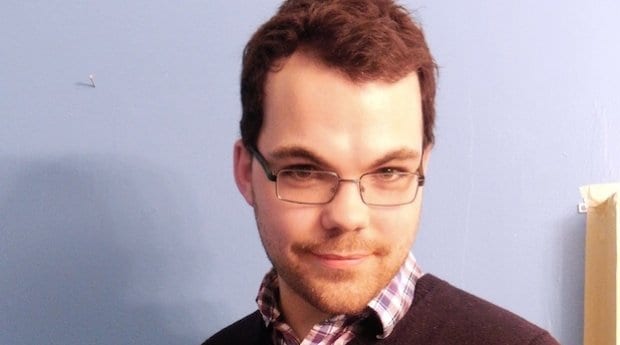The Capital Pride board of directors approved a motion June 17 to remove its vice-chair and director of communications, Luke Smith, from office.
The board alleges that Smith breached confidentiality by blind-copying a sensitive internal communication to include a contractor, forwarded an internal message to someone within the organization who should not have been privy to board-related emails, and forwarded a motion to a community partner before the board had discussed it.
“Any motion that has not been discussed at the board level and approved as part of the minutes is an internal document that is confidential to the board,” says Capital Pride chair Jodie McNamara. “Whatever reason a person may have for wanting to forward a motion before it has been discussed by the board, and made part of the public record when it’s approved as part of the minutes, is a breach of confidentiality, period.”
Smith, who resigned as vice-chair of the board June 16, contends that the third alleged breach fell within his fiduciary duties to the board. He says the person he contacted was the original author of the Pride committee bylaws, to clarify whether the board had the power to remove an elected director.
“There is a caveat within the policy which allows me to communicate for the purposes of completing my duties, and I was exercising my fiduciary duty to be fully informed of the bylaws which the motion was related to,” he says.
Smith says, and McNamara confirms, that the bylaws provide for the removal of an officer of the board, such as chair or vice-chair, but not their outright removal as an elected director of the organization.
One day after its original motion to remove Smith, the board reconvened June 18 to revise its motion. This time, it based the motion solely on Smith’s alleged breach of a signed confidentiality agreement, an infraction it claims would result in a director’s outright removal.
Smith alleges that the agenda of the June 18 meeting was not initially shared with him, but an email exchange between Smith and McNamara dated June 18 shows that Smith was informed of the board’s intention to revisit the previous day’s vote.
McNamara originally informed Smith that he would not be granted access to that meeting out of concern for further confidentiality breaches but later relented since Smith was still an elected director and thus entitled to attend.
“It is extremely underhanded in my opinion,” Smith says of the board’s initial attempt to exclude him from the June 18 meeting. “All directors have the right of access to a meeting, and all directors should be informed of an agenda. It’s out of practice for Capital Pride, but also, it’s out of sync with other boards and other charities.”
Although he was granted access, Smith opted not to attend the June 18 meeting, in an effort, he says, to avoid further tension.
In addition to the alleged breach of confidentiality, McNamara says the board received several written and verbal complaints from contractors, coordinators and outside parties relating to Smith’s communication style. She says more than one individual requested that they be allowed to report to a different member of the board.
“Problems existed and persisted with nearly all of the contractors with whom coordination and communication was Mr Smith’s responsibility,” McNamara alleges in an email sent to Xtra. “The damage control required during his tenure, and that remains necessary after his departure, has been a notable waste of Pride resources and volunteer time.”
In a Capital Pride document presented to Xtra, the names of the complainants have been redacted. Smith says the board presented him with little evidence of the complaints against him, though he acknowledges communication differences with one particular contractor, Brodie Fraser, over issues pertaining to the Pride Guide.
Smith says he and Fraser met and discussed the situation. “We came to the conclusion that the best scenario moving forward was to actually just work to the best of our abilities and demonstrate that we are both able to do our jobs, and that vastly improved the communication between the two of us,” he says.
Fraser declined to comment on any particular incident, saying it was an internal human resources matter. He says that his working relationship with Smith was a positive one and that he’s confident the Pride Guide will be a successful product.
McNamara alleges that Smith was aware of other complaints. She says that she and Smith had a meeting in which she informed him of all the complaints received up to that point and gave him the opportunity to rectify the situation. Smith, she says, never followed up. “It was like the conversation never happened.”
“I find that allegation very surprising,” Smith says in response. “The night prior to this motion being sent to me, I was in a two-hour meeting with the chair, and at no point in that two-hour meeting was any reference made to any of these allegations.”
McNamara says she can’t release the names of any of the contractors or community members who filed complaints against Smith. “They want their names kept confidential, and I respect that,” she says. “What I can confirm is, no, the issues were not resolved.”
Smith contends that the issues he is aware of were resolved. He also contends that his departure has left several of the initiatives he was working on, including bilingual and educational programming, on uncertain ground.
McNamara says that, in light of Smith’s departure, his responsibilities and portfolios have been shared among the remaining members of the board and that she is reporting on communications as a whole and handling general inquiries. She says that one or two additional volunteers have been recruited but that this is not unusual for the organization.
Although Smith feels the situation could have been handled better by the board, he acknowledges the pressures faced by the remaining members. “I think that, as a whole, the board is a team of very dedicated volunteers,” he says. “Capital Pride is running off of the back now of [seven] core volunteers, which is an incredible amount of pressure, and I wish them all the best.”
McNamara acknowledges the difficulty of the situation but says that ultimately, Capital Pride as an organization is not about the board of directors. “It’s about the community, and we have a responsibility to be spending our time and resources as per our mandate,” she says. “Being on the board isn’t a right. It’s a privilege . . . We collectively feel like we did what we had to do, and as a collective, everybody’s unanimous that we did the right thing.”
Luke Smith’s letter of resignation as vice-chair and officer of the board of Capital Pride
Capital Pride Festival minutes from special meeting held June 17
Capital Pride Festival minutes from meeting held June 18
Capital Pride’s most recent bylaws


 Why you can trust Xtra
Why you can trust Xtra


